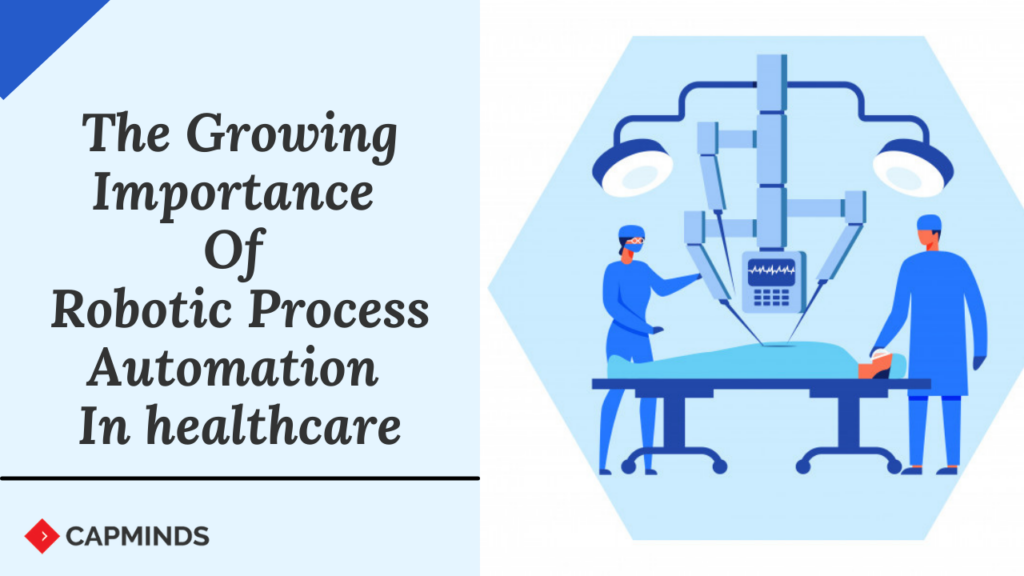The Growing Importance Of Robotic Process Automation In healthcare
To streamline practice workflow processes, more healthcare providers are shifting to robotic process automation. The technology shows great potential to save practice time and money by performing repetitive tasks at a quicker pace.
Still, despite its growing number of use cases which include updating electronic medical records. Simplifying medical claim processing and managing staffing levels of RPA
The Importance Of RPA
RPA robots are capable of mimicking almost any predictable human interaction, allowing them to log in to applications, move files, fill in forms, and more. Leveraging this technology in healthcare presents opportunities that can free up clinicians’ time and enhance care delivery.
Improving the healthcare cycle
Providers collect vast amounts of data from their patients each day from personal information to treatment cycle details. With the help of RPA software, healthcare organizations can extract and optimize patient data more effortlessly. In communicating with other digital systems, RPA software can manipulate collected data to generate analytics that offers clinical staff valuable insights to help them make more accurate diagnoses and offer tailored treatments to patients.
RELATED: ROBOTIC PROCESS AUTOMATION: RULING THE WORLD OF HEALTHCARE 2021
Scheduling new patient appointments
When a patient fills out a new patient appointment request form online, RPA robots can help to scan the incoming data, build out a condensed report and direct the appointment request to the correct work queue based on its defining attributes — including location, diagnosis, and insurance carrier. This presents clinics with a cost-effective method of scheduling new patient appointments, leading to increased satisfaction for both patients and providers.
Simplifying claims processing
Most claims involve processes such as data input, processing, and evaluation. Whether those steps are conducted manually or by generic software, the process is often time-intensive and error-prone — sometimes, even having a major impact on cash flow. RPA helps streamline the claims process by speeding up data processing and simultaneously reducing the number of errors. It can also help to address the recovery of revenue that might have been written off.
These are just a few examples of how this technology can improve accuracy across an organization and fuel profitability. Allowing RPA software to handle business processes will not only enhance clinical workflows but will return coveted time to staff and allow tailored treatments for patients.
How RPA ensures patient data privacy
The automation of hospital processes and operations using RPA makes use of sensitive patient data. Ensuring the security and privacy of this information is a top concern of healthcare organizations.
An RPA solution built with security in mind ensures medical data security and helps protect patient privacy. RPA software bots offer role-based access as a solution to data privacy. With this approach, only the correct people can access the private information of patients.
Patient data is handled by many hands, each wanting access to unique information. A physician’s demand for information varies from that of the management. The doctor looks at health records, whereas the management looks at financial and other logistical records.
RELATED: HOW RCM AUTOMATION IMPROVES YOUR AR EFFICIENCY?
RPA helps control patient data access while ensuring that each stakeholder only gets access to specifically relevant data. An RPA solution also automatically keeps a detailed audit history of data access. A healthcare organization can spot the issues or improper data usage in case of a data breach and make available data access records for an audit.
As with any other technology initiative, RPA implementations can fall short for a variety of reasons; among them, lack of training, poor use cases, excluding key stakeholders, and more.
Final Thoughts
For successful robotic process automation, following best practices such as outlining use cases and reviewing security. Also, consider RPA as a new technology with growing capabilities in the healthcare industry. So, when it comes to developing an RPA strategy, consider selecting the best RPA solutions in selecting the right partners to implement this technology appropriately.




